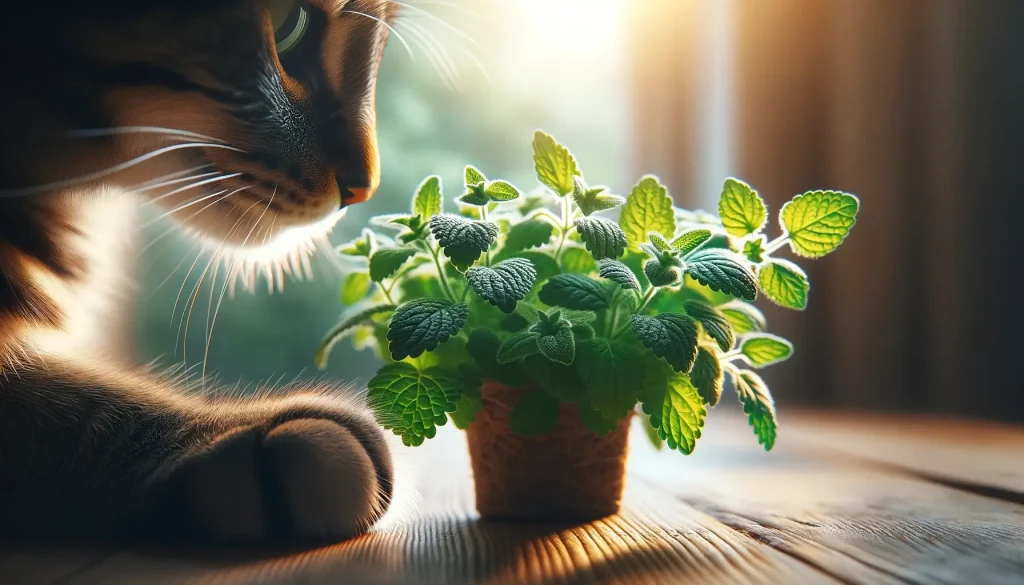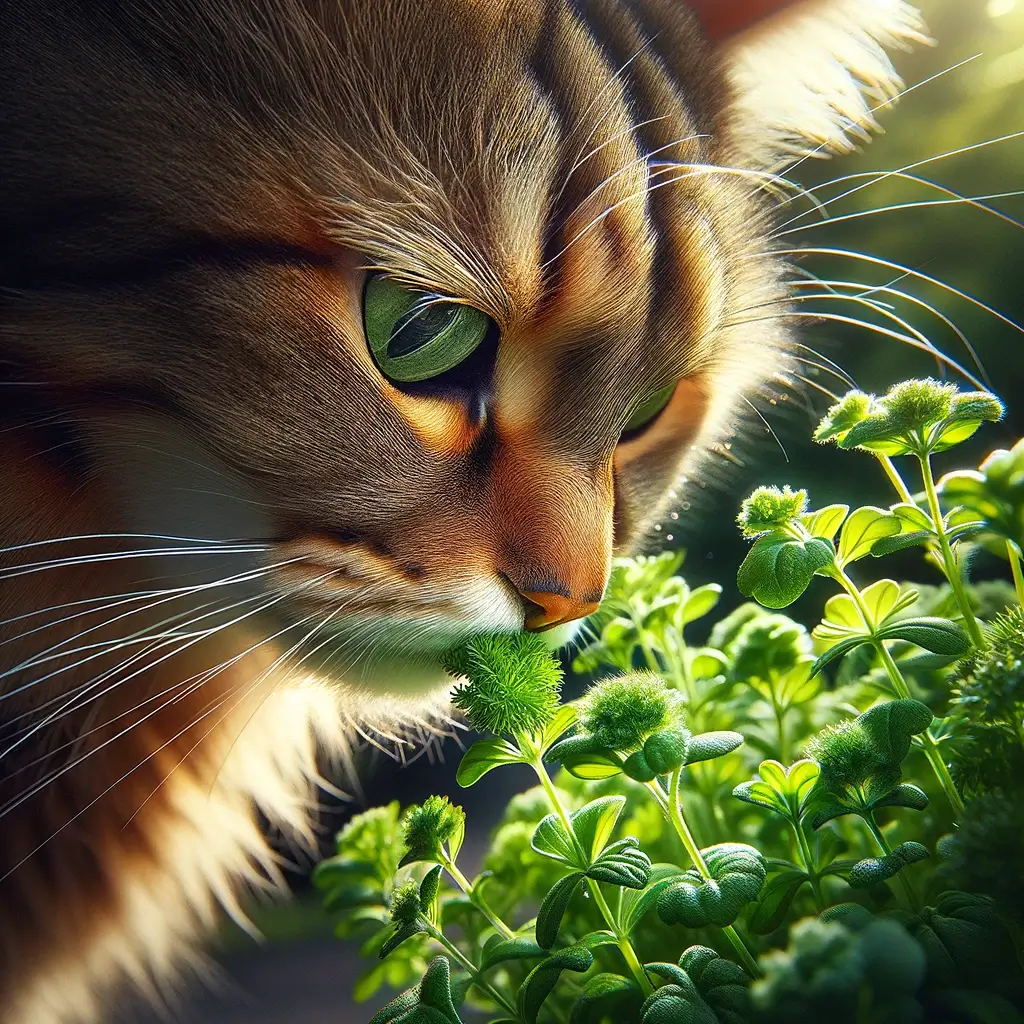
Understanding Cat Herb Safety
When exploring the world of natural healing for cats, one of the first questions that comes to mind is about safety. “Which herbs are safe for my cat?” is a common FAQ among cat owners venturing into herbal remedies. This concern is valid, as not all herbs beneficial to humans are safe for feline consumption. Certain plants can be toxic to cats, highlighting the need for a well-researched and cautious approach to herbal healing.
This section delves into the safety of using herbs for cats, addressing key concerns and providing guidance on how to avoid potential risks. We’ll cover essential aspects such as identifying herbs that are universally recognized as safe for cats, understanding dosage, and recognizing the signs of an adverse reaction. By offering practical tips and highlighting important considerations, this part of the guide aims to equip cat owners with the knowledge needed to use herbs not just effectively, but safely.
Whether you’re looking to alleviate minor ailments or support your cat’s overall wellbeing through natural remedies, ensuring the safety of the herbs you choose is paramount. Through a conversational and informative approach, we’ll help answer your burning questions about herb safety, making this journey into herbal healing as smooth and secure as possible for your furry friend.
Choosing the Right Herb for Your Cat
Here’s a practical guide for cat owners who wish to integrate herbal remedies into their pets’ healthcare regimen:
- Understanding Herb Functions: It’s crucial to know how different herbs work. Some herbs may have anti-inflammatory properties, while others might boost the immune system or act as natural sedatives. Knowing the primary functions of herbs can help in selecting the right one for a specific condition.
- Recognizing Symptoms and Conditions: Matching your cat’s symptoms with the healing properties of herbs is essential. For instance, if your cat is experiencing digestive issues, herbs known for aiding digestion should be considered.
- Consultation with Professionals: Always consult with a veterinarian before introducing any new herb into your cat’s diet, especially if your cat is currently on medication or has existing health conditions. A professional can offer advice on herb safety, dosage, and potential interactions.
- Dosage and Administration: Understanding the correct dosage is critical. Even safe herbs can become problematic if administered in large amounts. The form in which the herb is given (e.g., dried, fresh, infused in oil) can also affect its potency and effectiveness.
- Observation: After administering an herb, closely observe your cat for any signs of adverse reactions. Even herbs deemed safe can cause individual sensitivities or allergies in some cats.

Herb for Common Conditions
For Digestive Issues
Slippery Elm Bark is gentle and can help soothe the digestive tract, relieve diarrhea, and reduce irritation. It forms a gel-like substance when mixed with water, which is easy for cats to ingest.
Behavior and Mood
Catmint induces a temporary euphoria in cats, promoting playful behavior and relaxation. It encourages exercise, reduces stress, and enhances natural hunting instincts.
For Stress and Anxiety
Valerian Root can act as a sedative, helping to calm anxious cats. However, it should be used cautiously and under a vet’s guidance due to its potent effects.
For Skin Irritations
Chamomile has anti-inflammatory and antimicrobial properties, making it beneficial for treating skin irritations and minor wounds. It can be used as a rinse or applied topically in a diluted form.
For Respiratory Health
Licorice Root acts as an expectorant and anti-inflammatory agent, which can be helpful in treating mild respiratory issues. However, its use should be limited to short durations under veterinary supervision due to potential side effects.
For Immune Support
Echinacea can help boost the immune system, making it useful for cats recovering from illness or needing immune system support. However, its effectiveness and safety in cats require careful consideration and professional advice.
Monitoring and Adjusting Herbal Treatments
As you integrate herbal remedies into your cat’s care routine, monitoring their responses and adjusting treatments as necessary are critical steps. Here’s a roadmap for assessing the effectiveness of herbal interventions and making informed adjustments to ensure the optimal health and safety of your feline friend.
- Observational Foundation: Close observation of your cat’s behavior and physical condition is crucial. Keep a journal to track changes in appetite, energy levels, mood, and symptoms.
- Understanding Timeframes: Herbal remedies may take weeks to show effects. Be patient and consistently monitor your cat’s response over time.
- Dosage Adjustment: Adjust herb dosage based on observations and initial responses, consulting with a vet before significant changes.
- Recognizing Adverse Reactions: Watch for signs like gastrointestinal upset or behavior changes. Discontinue the herb and seek vet advice if adverse reactions occur.
- Professional Guidance for Long-term Use: Regular check-ins with a vet are recommended for chronic conditions. They can assess treatment effectiveness and make adjustments as needed.
- Integration of Feedback: Refine treatment plans based on observations and professional advice, considering herb combinations or alternatives tailored to your cat’s needs.
By methodically monitoring and adjusting herbal treatments, cat owners can ensure the safest and most effective care for their pets.


Balancing Home Remedies and Vet Visits
Deciding when to rely on home remedies and when to seek professional veterinary care is crucial for the health and safety of your cat. While natural healing methods can offer significant benefits for minor ailments or as part of a preventive health regimen, recognizing the limitations of these remedies is essential.
Understanding the Role of Home Remedies
Home remedies, including herbs, can manage minor issues like digestion, wounds, or stress, and support overall wellbeing. However, know their limits and use them wisely.
Recognizing Signs That Require a Vet Visit
Certain symptoms and conditions warrant immediate veterinary attention, regardless of the potential benefits of home remedies. These include but are not limited to:
- Severe pain or distress
- Persistent vomiting or diarrhea
- Difficulty breathing
- Sudden changes in behavior or mobility
- Signs of poisoning or ingestion of toxic substances
Combining Approaches for Optimal Health
Integrating home remedies into your cat’s health regimen can be beneficial, but it should complement, not replace, regular veterinary care. Preventative visits to the vet can catch issues early, and professional diagnosis and treatment are irreplaceable for serious health concerns.
Consultation Before Implementation
Before introducing any new home remedy, especially herbs, consulting with a veterinarian is advisable. This is particularly important for cats with pre-existing conditions or those on medication, as there could be adverse interactions.
Educating Yourself on Safe Practices
Education is key to safely using home remedies. Understanding the proper dosage, preparation, and potential side effects of any treatment is necessary to avoid harm. Resources like reputable herbal guides for pets, veterinary advice, and scientific studies can provide valuable information.
Balancing home remedies with professional veterinary care allows cat owners to support their pets’ health effectively. This approach ensures cats receive the benefits of natural healing while also benefiting from medical advancements and professional expertise for more serious health concerns.

Herb Gardening for Your Cat’s Health
Incorporating a herb garden dedicated to your cat’s health is not only a sustainable approach to natural healing but also a rewarding hobby that brings you closer to nature’s remedies. This section delves into the basics of starting your own cat-friendly herb garden, offering practical tips on how to grow and maintain herbs that can contribute positively to your cat’s wellness.
- Starting Your Herb Garden: Begin by selecting a sunny spot, either outdoors or indoors, where herbs can thrive. Consider using containers or raised beds to control soil quality and drainage. Choose non-toxic herbs that are known to be safe for cats, ensuring a supply of fresh, chemical-free greens.
- Herb Selection: Focus on herbs that offer health benefits for cats. For instance, catnip can provide entertainment and relaxation, while wheatgrass can aid in digestion and help prevent hairballs. Other safe options include valerian (for stress relief), cat thyme, and lemon balm.
- Organic Gardening Practices: To ensure the safety and health of your cat, adopt organic gardening practices. Avoid the use of chemical pesticides and fertilizers, opting instead for natural alternatives. Composting can enrich the soil naturally, while companion planting can help deter pests.
- Harvesting and Storage: Learn the best times to harvest herbs to maximize their medicinal properties. Generally, it’s best to harvest in the morning after the dew has dried but before the sun is at its peak. Dry or freeze herbs to preserve them for year-round use.
- Safety and Accessibility: Make sure your cat has safe access to the garden, allowing them to explore and nibble on the herbs under supervision. However, it’s important to monitor their intake to prevent overconsumption, which could lead to digestive upset.
- Benefits Beyond Health: A herb garden can also enhance your cat’s environment, providing sensory stimulation that supports their mental wellbeing. The process of gardening itself can be a therapeutic activity for you, promoting a deeper connection with the natural world and your feline companion.
By cultivating a herb garden for your cat, you not only contribute to their physical health but also enrich their environment, offering them a piece of the outdoors that stimulates their instincts and curiosity.
Beginner Guide to Raising Quail at Home
What are the Signs of a Dog Concussion?
What Causes Your Dog’s Ears to Smell Bad?
When your dog’s ears start to emit an unpleasant odor, it might leave you puzzled…
Methimazole Treatment for Cat Hyperthyroidism
Methimazole plays a crucial role in managing feline hyperthyroidism, a condition marked by an overactive…
Got Hummingbirds in your Backyard? Here’s How to Care for Them.
Why Does Your Cat Pee Outside the Litter Box?
Cat’s Litter Box Issues It’s not uncommon for cat owners to face the frustrating dilemma…




